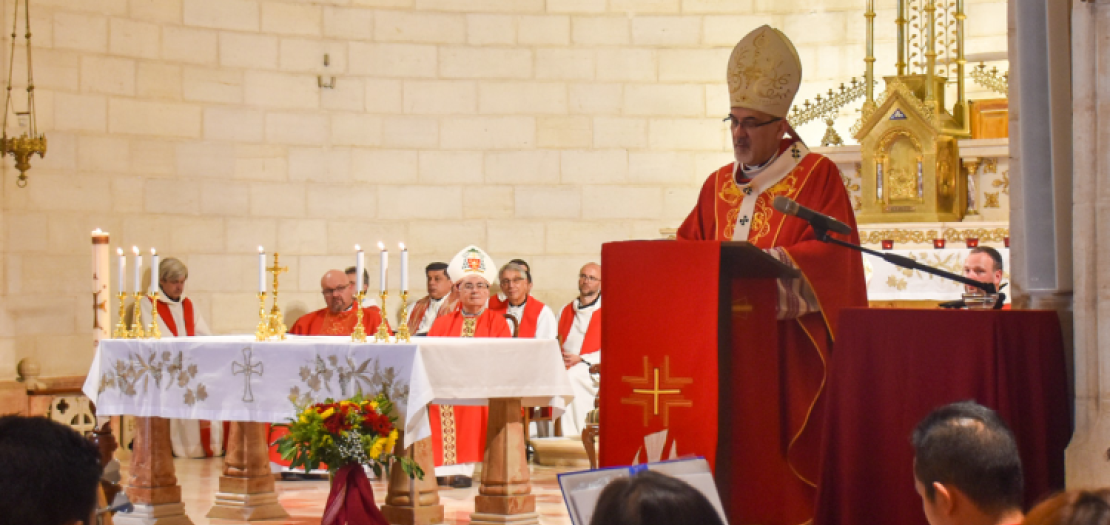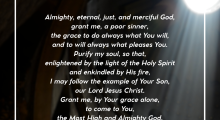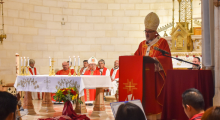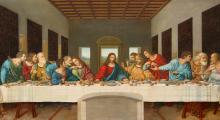Issued by the Catholic Center for Studies and Media - Jordan. Editor-in-chief Fr. Rif'at Bader - موقع أبونا abouna.org

Following is the text of Patriarch Pizzaballa's Pentecost Homily at the Dormition Abbey in Jerusalem, dated 8 June 2025,
Dearest Father Nikodemus,
Dear Brothers of the Dormition, dear Brothers and Sisters,
The Lord give you peace!
The Gospel we heard today (John 20:19-23) takes us back to the evening of Easter: according to the evangelist John, on this evening Jesus appears to his own, who had locked themselves in the house out of fear, and immediately gives them his Spirit.
John closely links the gift of the Spirit with the Passion and Easter, as one great movement, one mystery of redemption: he wants to emphasize and make us understand that the Spirit emanates from the cross, from the open side of the life-giving Lord. There can be no Spirit without this self-giving that Jesus accomplished for us on the cross. On the other hand, Easter is only fulfilled where the Holy Spirit is communicated to people.
The purpose of Easter is for the life of the Risen Lord to dwell in us, for us to share in his way of life. That is why, on the day of his resurrection, Jesus immediately goes to his own and shares with them the life that the Father has given him: This life, which is a true life because it has been reborn from the depths, is now there for all who wish to receive it.
To say that Jesus gives the Spirit, the evangelist John uses an important and very rare term: we only find it here in the New Testament. He then says that Jesus breathed on them, (John 20:22), but it could also be translated as “into” them: The Spirit is a gift that does not remain outside the person but penetrates them, that becomes the very breath of the person.
This verb, which is unique in the New Testament, is already found at the beginning of the Bible: after God had formed man from earth, “the Lord God formed the man out of the dust of the ground and blew into his nostrils the breath of life, and the man became a living being” (Gen 2:7): Man is thus composed of two elements, both of which are characterized by great precariousness: the dust of the ground, i.e. the most fragile and least substantial part of the earth, which for this reason symbolizes the fragility of his physical constitution, and the breath of life, which refers to everything that makes an inanimate body a living person: everything that makes it breathe, that gives the possibility of life.
Now, just as God blows natural life into Adam so that he may live, so Jesus blows the breath of new life into the disciples so that they may live as resurrected persons: The Spirit is not something additional, an accessory, but the very thing that makes us live. Man is a creature called to hold these two elements together, which in themselves would be as far apart as Heaven and Earth.
Pentecost finally reveals the mystery of man: On Easter Eve, through the breath of Jesus, God makes us into a new creature called to hold together natural and divine life, flesh and spirit, earth and heaven. Only then is man fulfilled.
And not only that. But there is another element that illuminates this fulfillment of creation that Pentecost accomplishes: In the Genesis account, God’s work concerns man, the first man, the individual. At Pentecost, things are different: on Easter Eve, Jesus gives the Spirit to the disciples gathered together and creates them anew as a community of brothers. The church is born.
The work of the Spirit is an event of communion that creates a fraternity, reconciles differences and makes unity possible. In other words, it is the origin of the Church. The new life of the Spirit is a life that is no longer lived in the solitary search for its own fulfillment, but in the encounter with the brother and sister with whom life is shared: It cannot be lived if it is not in turn communicated, shared, given, because this life is nothing other than a gift. If we withhold and possess it, we extinguish the Spirit and return to death.
Closely linked to the gift of the Spirit is therefore the gift of forgiveness of sins (“Whose sins you forgive are forgiven them, and whose sins you retain are retained” - Jn 20:23), i.e. the ability not to allow evil to overtake people and destroy their relationships: the apostles, filled with the Holy Spirit, are sent to do the same thing they saw in Jesus, namely to bring life where there is death. This is the Spirit they received.
Today’s gospel and the feast of Pentecost are a reminder to our church.
Unity, diversity, community, relationship, sharing, self-giving, love, peace... these are the words that resonate at Pentecost when we speak of the gift of the Holy Spirit and the birth of the Church. They seem very far removed from what we are experiencing at this time. Everything seems to say exactly the opposite. The slogans we hear are under the banner of hatred, mistrust, contempt and division, but also of incomprehension, feelings of abandonment and loneliness. Many are also angry at God, as if he were responsible for all this. The tragedy that Gaza is experiencing has become a bit of an image, a symbol of this drama that affects the whole of the Holy Land.
So today we are called to decide. Whether to be guided by the Holy Spirit that we have received and that is in us, whether to become those who give expression to the life of God in us, to the Spirit that Jesus has breathed in us, or whether to let the flesh determine our choices, that is, whether to live only as those who are made of the dust of the ground, like the first Adam.
It is not about becoming irenic, seeing an ideal world and alienating ourselves from the painful reality we live. It is about being able, despite everything, to accept the gift of life, to commit ourselves to relationships that open horizons, to commit ourselves to building where today everything seems to be destroyed, in other words, to commit ourselves to the first gift that Jesus gave his disciples in the Upper Room: peace. (“Stood in their midst and said to them, “Peace be with you” - John 20,19). We must not simply wait for others to give it. The disciples have received it with the Spirit, and therefore they must pass on what they already possess, build it up, realize it, always and everywhere, despite everything. In collaboration with everyone, he is called to share this precious gift, the peace that is already in him, in his undivided heart. Will we solve the serious problems that afflict the Holy Land? Probably not. But we can and should still be a different voice, share a different style, a different way of living in the Holy Land. This is perhaps the first and most important mission of the Church in Jerusalem today.
Pentecost, in short, calls us to become those who build unity, sharing, love and peace, which are a gift from above, but which must be built with our own hands, our own commitment and our own sincere desire. Even today, even here in the Holy Land. I would say especially today and especially here. The Spirit is the power that sustains us, but it cannot replace our free choice to live as children of God.
May the Lord forgive us our unfaithfulness, make us in turn capable of forgiving one another and strengthen us in our common desire to become agents of the Spirit’s work in the world and builders of unity and peace.







